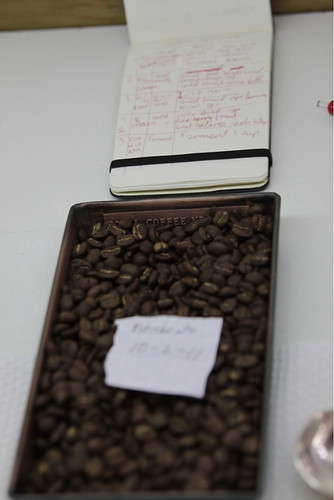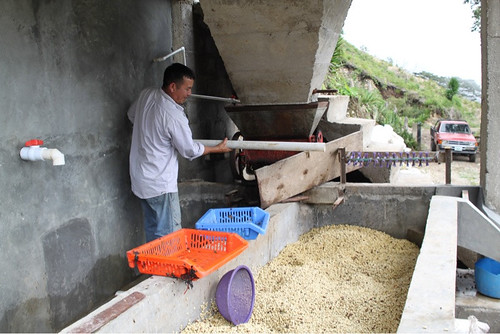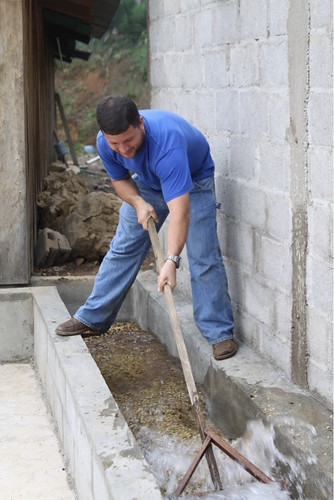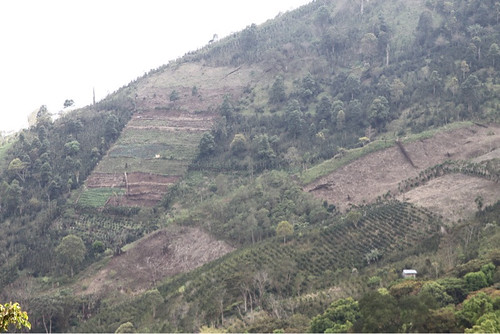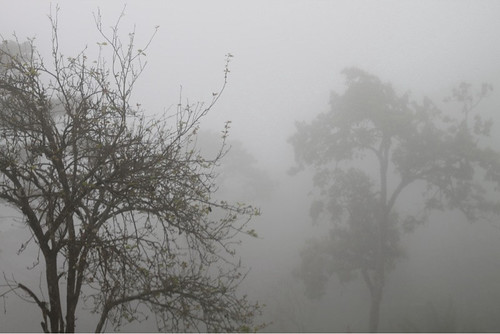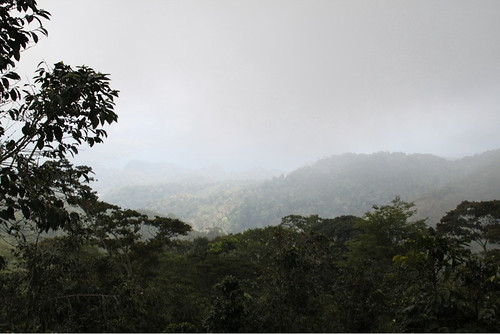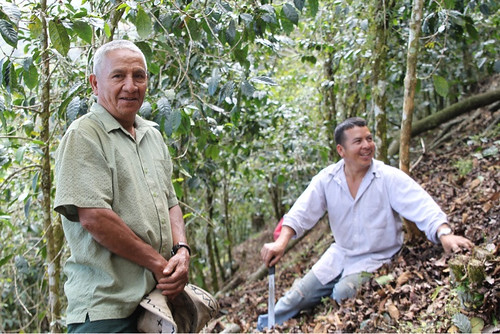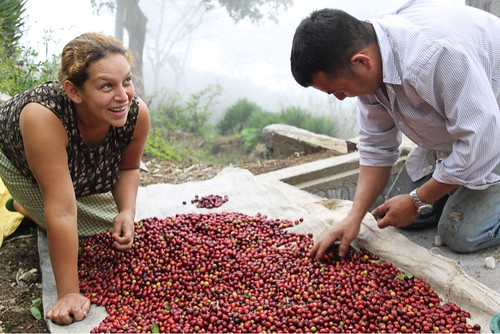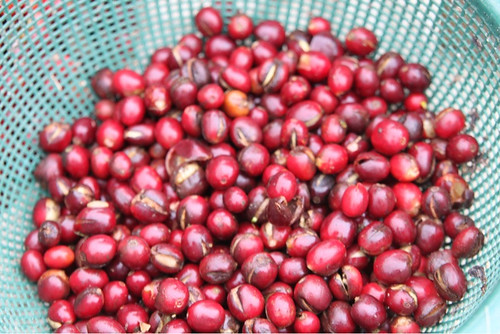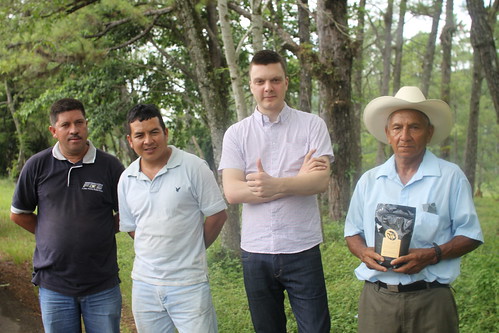Yesterday I spent a whole day with Jobneel at him and his father’s farms Nacimiento and Cielito Lindo in Santa Barbara in Honduras.
As I had already been to the farm last year, I asked Jobneel if he could show me how they pick and process their coffee at the farm.
Normally they would be in full harvest by now, but due to climatic changes, they had only done the first picking and were still waiting for the main harvest to happen in March / April.
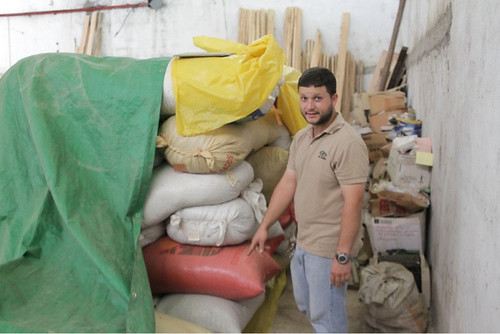
(My exporter, Angel showing me Jobneels diferent lots)
Fortunately, Jobneel had already finished the first picking and separated his lots into different varietals, like I had suggested for him after last years visit. Early in the morning I had the chance to cup two different Bourbon lots next to a lot of Pacas and Catuai and Extreberto’s Catimor varietal (IHCAFE 90) and some of the coffees from the neighbouring farms. I insisted cupping the coffes blind as always and for the fourth year in a row I selected Extrebertos coffee to be the best. I actually thought his coffee was Catuai due to a misprint on the Cup of Excellence web page about his coffee, and therefore was very surprised to learn that the coffee was in fact a Catimor varietal. (Catimor is often regarded as a low quality varietal due to its genes from Robusta plants.)
After the cupping I went straight up 700 meters in an old Toyota pickup, to visit Jobneel and Extreberto at their farms. At he end of the road on top of the mountain at 1500 meters above the sea is the farmhouse of Nacimiento where Jobneel and his family stays during the harvest.
Upon arrival I could clearly see some changes from last year. Jobneel had spent a lot of the money he earned last year on a new wet mill with 2 fermentation tanks and a washing channel, water reservoir, etc. Compared to the old wooden tanks and tiny depulping machine it was a huge improvement. The mill was just finished and Jobneel had only used it twice before I came, so I had to teach him a few tricks I learned in Kenya in November on how to properly wash coffee to remove floaters, etc. (I will post a video of his processing technique later)
I also got a 2 hour tour of the farm where we looked at all the different varietals he is growing (40 year old Bourbon and old and new Catuai, Pacas and Catimor ) I convinced him not to remove the old trees, but rather prune them so that they get more healthy. Old trees have proved a few times to produce better quality due to stronger roots and less fruit on the tree.
Walking, or should I say climbing around the farm is breathtaking, both because of the high altitude and extremely steep hills but also in terms of the scenery. The day was very cool and misty and I could only in brief moments catch the beautiful view of the lake and surrounding mountains.
In one of the steepest hills (probably 55 degrees) I met Extreberto, Jobneels father. Extreberto is 73 years old but still working every day. As a matter of fact he was picking coffee so that I could see how they process the cherries later in the afternoon.
One of the things I noticed when they were picking was that a lot of the cherries had cracked due to a lot of rain and sun. I had earlier on my trip learned that this may be a reason for phenolic defect in the coffee (Phenol tastes medicinal and mould and is a huge problem as one bean will affect the taste of a whole pot of coffee.)
I also noticed that a lot of the pickers were picking a lot of these cherries and green unripe cherries among the ripe cherries. I explained to Jobneel that in Kenya all the farmers remove the green and bad cherries from the ripe cherries before they are processed, so I suggested for Jobneel to start doing the same. Fortunately he is very commited to growing quality so he decided to start immediately. That meant we had to get on our knees and remove all the bad fruit from the good coffee before processing.
Angel (my exporter and partner of Jobneel) decided to make an experiment to see if the cracked fruit would taste like phenol, so we separated that from all the other cherries to process and taste to see if we are right.
After a long day with many discussions, we concluded that Jobneel is going to do the following this harvest:
- Separating all varietals in to separate lots so we can taste the difference and choose the best ones and pay according to quality.
- Remove all unripe, black and cracked coffee cherries from the ripe ones before processing.
- Pay the pickers a premium for being more selective and thourough during picking.
- Test the Kenyan washing technique to remove floaters and pulp from the parchment.
- Plan to build a solar dryer for the wet parchment coffee for next years harvest.
After a lovely home made dinner before the end of my visit, Jobneel politely took me aside to ask me if we were willing to pay a bit more for his coffee this year as he had made a lot of investments and I had also suggested a lot of new techniques for him to implement that would add more costs to his production. He also wanted to know if we will buy his coffee in the future and how much coffee we need from him this year. He even asked if it was ok with me if he participated in the Cup of Excellence.
My reply was of course, Yes! Please participate in the COE. Yes, we will continue to buy his coffee as long as he is producing high quality and Yes we will pay according to our agreement from last year which was between USD 4 to 6 per lb of coffee depending on the quality.
All in all I am just extremely happy, Inspired and greatful to see that Jobneel and Extreberto are still committed to do the extra work to produce quality, that they invest in their farm for the future and that they are willing to improve and experiment to develop the quality of their coffee. This is not normal to see this year when the farmers are getting payed USD 3 – 4 per lb even for the worst qualities due to the record high New York C -market prices.
I am really looking forward to taste the coffees they are about to pick, and most likely they will be in Norway in August.
Thumbs up!

